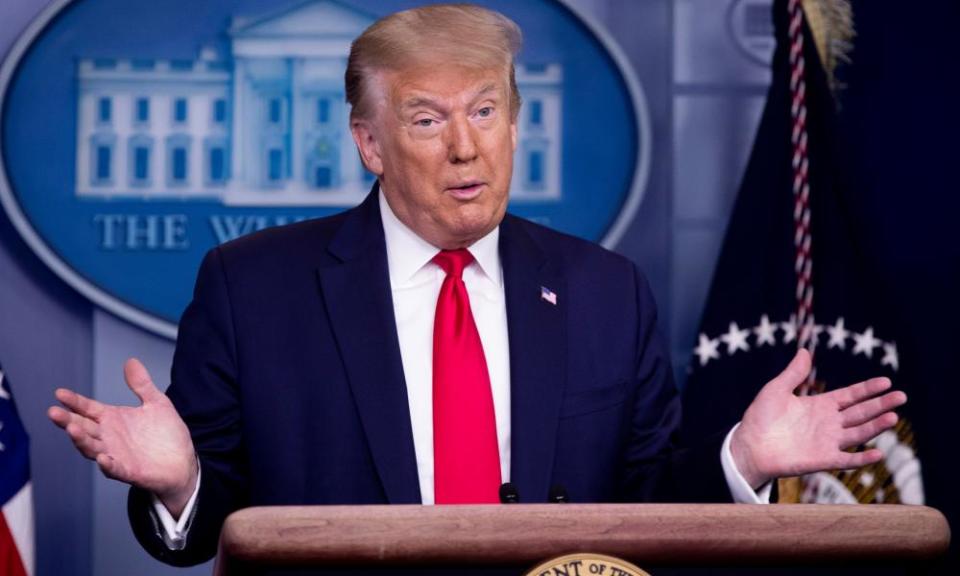Trump is scooping up the world’s remdesivir. It’s a sign of things to come

Donald Trump has called Covid-19 a hoax, encouraged his followers to take hydroxychloroquine and threatened to cut all ties between the US and the World Health Organization. He has predicted that coronavirus will disappear one day, like a miracle, organised indoor rallies with no masks during the height of the pandemic and encouraged public health officials to slow down testing, because carrying out tests results in a larger number of confirmed cases. He has praised scientists for developing an HIV/Aids vaccine (which doesn’t exist), been accused of stealing 20 ventilators from Barbados and taking face masks from Germany and France.
In this wild west moment in international relations, Trump boasted this week that the US had bought the world’s entire supply of remdesivir, the antiviral drug produced by the US biotechnology company Gilead. Remdesivir is one of the few proven medications for treating Covid-19 patients. Though low- and middle-income countries can still produce their own generic versions of the drug, European and other high-income countries are not able to buy remdesivir or produce it for three months. Fortunately the UK and Germany have stockpiled enough of the drug to treat all the patients who need it.
Trump’s “America first” behaviour is in keeping with how powerful states usually behave during outbreaks. During the 2014 Ebola epidemic, an experimental therapy called Zmapp made headlines. Ebola is one of the deadliest viruses to humans and kills about 70% of people who catch it if they don’t receive medical support. Zmapp had only been trialled in 18 rhesus monkeys, but even in relatively late stages of the disease it was 100% effective in the monkeys recovering. A mass scramble followed, with countries desperate to acquire the limited doses of Zmapp available. Powerful, high-income countries such as the US and Spain were able to procure Zmapp for their health workers, while doctors and nurses in west African countries were largely left without an effective treatment.
This issue was also raised during the H5N1 avian flu outbreak in 2006, when the Indonesian health minister Siti Fadilah Supari expressed concern that low- and middle-income countries had to share virus samples with the WHO and associated research centres, but did not benefit from the resulting products (vaccines, therapeutics, diagnostics). Supari invoked the principle of “viral sovereignty” to argue that it made no sense for countries to share viruses freely when these would ultimately end up in the hands of pharmaceutical companies that would sell their vaccines to the highest bidder – most likely the US and European governments.
Supari’s frustration clearly highlighted the way in which access to essential medicines and vaccines has always worked: whichever government can pay the most will get the product, regardless of where the virus samples or trials that were central to its development actually took place. After years of negotiation, the WHO finally agreed the pandemic influenza preparedness framework, which provides a roadmap for how research products for that virus can be shared equitably across countries around the world.
As the world fixates on when a Covid-19 vaccine might become available, recent history shows us that rhetoric about solidarity and cooperation easily gives way to a mad scramble of competing national interests. At the WHO assembly this May, a resolution was passed by all member states to make Covid-19 research products global public goods. But these will be empty words in the absence of hard discussions and concrete details about which countries are at the front of the queue, how many doses each country will have to access to, and how principles of fairness and equity will run through all decisions. When a vaccine or new therapy for Covid-19 is discovered, we can expect the clamour from citizens to become louder, and the pressure on governments to intensify.
What Trump knows best is that the only thing that matters in business is money. Unfortunately, this also applies during a pandemic, when whoever has the most money can afford the most vaccines and essential medicines, too.
• Prof Devi Sridhar is chair of global public health at the University of Edinburgh
